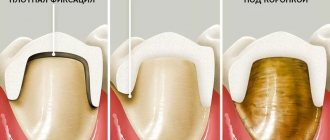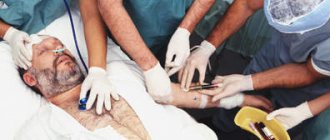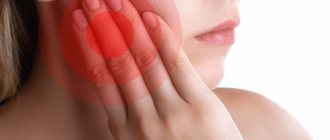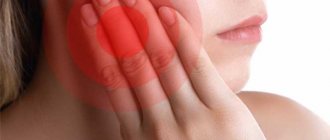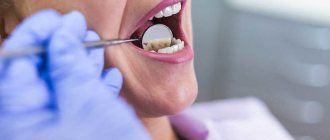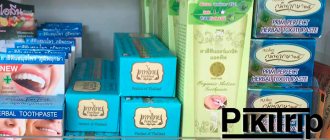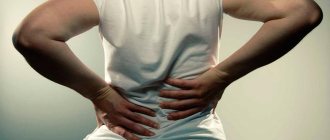Toothache is a painful phenomenon, especially when it occurs at night and prevents you from falling asleep until the morning. The reasons that teeth begin to ache and ache at night are not at all due to self-hypnosis, but to natural processes that take place in the human body. What diseases does night toothache indicate and how to deal with this problem?
Why do my teeth hurt at night?
Main reasons
The source of pain in the oral cavity is the inflammatory process, which is provoked by pathogenic microorganisms.
They begin to actively multiply, and this eventually leads to caries, swelling or fluxes.
In addition to microorganisms, tooth enamel can be affected by various aggressive substances, which corrode its surface.
Causes of pain:
- caries;
- flux;
- pulpitis;
- enamel crack;
- poorly filled root canal;
- periodontal disease;
- not completely removed tooth;
- alveolitis;
- increased sensitivity of enamel;
- damage to the root canal wall;
- various dental injuries.
Pregnant women and children are at greatest risk. During pregnancy, the mother shares all the beneficial substances with the baby, so her body experiences a lack of vitamins and microelements.
Children often have to be taken to the dentist, as baby teeth are quickly exposed to the negative effects of caries.
Useful video
Whether your tooth hurts during the day or at night, tips on how to eliminate unpleasant symptoms are always helpful:
Toothache causes a lot of discomfort to people, especially when it gets worse at night.
Toothache is a painful phenomenon, especially when it occurs at night and prevents you from falling asleep until the morning. The reasons that teeth begin to ache and ache at night are not at all due to self-hypnosis, but to natural processes that take place in the human body. What diseases does night toothache indicate and how to deal with this problem?
We suggest you familiarize yourself with When which teeth are cut: the order and timing of eruption - Many teeth
Physiological and psychological factors
When a tooth aches at night, it is quite difficult to cope with this condition, because sometimes even painkillers do not help. The reasons for this reaction can be both physiological and psychological factors.
Physiological factors:
- At night, a person is in a horizontal position, and this increases blood flow to the jaw and head. A person may feel a pulsation as pressure is placed on the inflammatory tissues of the oral cavity. In addition, nerve endings actively react to this condition.
- Vagus nerve Vagus. Physiologists have proven the fact that in the period from 12 o'clock at night to 5 am the body is most susceptible to various kinds of diseases and inflammatory processes.
The vagus nerve consists of many nerve branches that change their tone during the night. It is the vagus nerve that can influence sensitivity to pain. - Increased blood pressure at night. In the evening, pressure in the body of even a healthy person can increase, and this affects blood flow in the head and jaw.
- Inflammation of the tertiary nerve . People often confuse inflammation of this nerve with toothache, since often the tertiary nerve can cause pulsation in the jaw.
Various ENT diseases will “help” to complement the feeling of soreness in the oral cavity.
Psychological factors appear only in our heads. During the whole day, a person is actively engaged in some kind of work, so he does not have time to concentrate on a sore tooth.
When the body relaxes at night, concentration occurs more actively. We begin to feel pulsation in the oral cavity, soreness, increased sensitivity, etc. The next morning there is a sharp need to stop this torment.
Is it possible to take antibiotics for toothache, and which drugs are the safest?
Let us explain here popularly why, after removing a nerve, a tooth hurts when pressed.
At this address https://zubovv.ru/lechenie/zubyi/kak-delaetsya-provodnikovaya-anesteziya-v-stomatologii.html the technique of conduction anesthesia in dentistry is presented.
Pulpitis
Pulpitis is a complication of caries that has reached soft tissues. This is one of the most common inflammations, which is characterized by prolonged and severe pain.
It especially increases at night, because pulpitis is formed due to the active proliferation of pathogenic microorganisms.
When pus begins to accumulate in the soft tissue cavity, it simply has nowhere to go. Bacteria multiply even more actively, which leads to even greater inflammation.
Pulpitis can cause an increase in body temperature, weakness and nervousness.
Wisdom tooth hurts
A special unit in our body is the wisdom tooth. It usually erupts at the age of 18-25 years, and severe pain may occur. The molar breaks through the bone and gum tissue, essentially tearing it apart. At night, the pain may intensify; it can be relieved with the help of pain-relieving gels (Cholisal, Metrogyl Denta, Asepta) or analgesics.
It’s good if the tooth runs vertically and has enough space in the gum. A much worse option is when the molar breaks through at an angle or even horizontally. The “figure eight” puts pressure on the roots of neighboring teeth and displaces them. In addition to pain, swelling of the gums and cheeks may appear, as well as an increase in body temperature. As a temporary option, you can take painkillers, but the problem will have to be resolved with a surgeon. As always, the sooner the better.
A wisdom tooth can simply hurt due to caries, pulpitis, periodontitis, or cysts. Another reason is inflammation of the so-called hood, a fold on the gum that forms when teeth erupt. The cause of pericoronitis is the accumulation of food particles, which gradually begin to rot, accompanied by pain in the “eight” area. In the most severe situations, pus begins to secrete.
To relieve pain, you can rinse your mouth with warm infusions of herbs (sage, chamomile), use a gel and take a pain reliever. And in the morning - to the doctor.
Important.
A wisdom tooth is also a tooth. But, if it interferes with the normal position of the teeth, causes crowding, or if the dentin is deeply damaged, dentists recommend removing it.
Diagnostics
To quickly begin treatment of the inflammatory process in the oral cavity, it is necessary to correctly diagnose the disease.
First of all, dental patients undergo a visual examination by a doctor. For more in-depth diagnostics, different equipment is used:
- A radiovisiograph takes x-rays of the painful area with minimal radiation.
This method helps to see a clear picture of the disease. The doctor can view the resulting images from the radiovisiograph on computer equipment. This method helps to see the extent of the inflammatory process, the complexity of the root canals, the location of the tooth, etc. - An orthopantomograph is a device that takes overview photographs of the dentition.
This method allows the dentist to see the location of the teeth from all sides. It is often used in the diagnosis of diseases associated with damage to the soft tissues of the jaw and bones. It is also used in the process of correcting bites and prosthetics. - An apex locator can be called a modern device that helps the dentist see the complexity, depth and length of the root canal.
This helps the specialist to carry out high-quality filling of the canals, for example, in the process of treating caries or pulpitis. The apex locator also facilitates the correct selection of all the necessary tools for carrying out manipulations during the filling process. - The dental camera is designed for patients rather than dentists. With its help, the patient will be able to see a clear picture of his oral cavity. Using a dental camera, doctors are able to determine the depth of tooth decay in the early stages.
- A dental microscope contributes to the precision of treatment. It is often used to diagnose pathological processes in the mouth, at the time of root resection and when removing part of the crown. It helps to enlarge the image 25 times, which is important at the diagnostic stage.
All of the above devices can be called basic. Depending on the complexity, specialist pathologists can use computed tomography, panoramic radiography, etc.
Treatment
Toothache can be simply unbearable, so you need to know several methods that can really stop this torment. You can relieve pain even before visiting the dentist.
First aid
Acute toothache is not a death sentence, because you can fight it. There are several first aid rules in this case:
- You cannot take a horizontal position , as the pain will intensify even more.
- Do not apply a warm heating pad or compress to your cheek . Heat will increase blood flow, and this will provoke even greater pulsation and inflammation.
- For severe pain, it is better to prepare a rinse solution based on soda and salt. Dissolve 1 teaspoon of each substance in a glass of warm water. The water should not be hot. The substances must completely dissolve. Rinse every 30-40 minutes.
- After rinsing, you can take a painkiller. This could be Tempalgin, Aspirin, Ibuprofen, Analgin. Ketanov is often used to relieve pain, but this drug is too strong and can cause a number of side effects.
- To consolidate the effect, you can put a tampon with a crushed painkiller tablet on the sore tooth. If necessary, you can purchase special dental drops.
You cannot increase the dose of medication; you must take the tablets strictly according to the instructions.
Find out how to quickly relieve toothache from the video.
Local therapy
There are times when taking pills does not give the desired effect, so you can resort to local therapy, such as painkillers gels.
The following drugs are suitable as such drugs:
- Cholisal gel – relieves inflammation, fights microorganisms, relieves pain;
- Anise oil – improves tissue restoration, relieves swelling, helps get rid of pus;
- Metrogyl Denta - relieves swelling and inflammation, fights pain somewhat worse than Cholisal;
- Kamistad gel – relieves pain, does not cause allergies, reduces swelling of tissues.
The drugs should only be applied to the diseased tooth and the gums around it; the permissible frequency and amount of application of the drug should not be exceeded.
Taking antibiotics
You can take antibiotics only with a doctor's prescription. Not all groups of drugs can cope with microorganisms that cause the inflammatory process.
Antibiotics help well in the process of treating gumboil, since pus can accumulate in the dental cavity. The doctor will help the pus come out, but there is no guarantee that it will not begin to accumulate again.
Treatment is carried out using:
- Amoxicillin is a broad-spectrum antibiotic, so it relieves inflammation in gumboil and pulpitis well.
Eliminates staphylococci, E. coli, streptococci. Adults can take no more than 6 g of the drug per day. Children can be prescribed this drug only from 12 years of age, taking no more than 500 ml at a time. - Amoxiclav is a drug that contains clavulonic acid and amoxicillin.
Prescribed for the treatment of infectious inflammation in the oral cavity. Adults can take it for 5 days, the daily dose is 250 mg. Drink every 8 hours. Important! If local treatment is not carried out by a dentist, then taking antibiotics may be ineffective. - Lincomycin is available in capsule format and belongs to the group of lincosamides. Therapy for an adult can last up to two weeks. Take 3 times a day, 500 ml. For children, the norm is calculated differently. For 1 kg of weight 30-60 ml of the drug.
Folk recipes
Gargling with sage decoction
Ingredients: 20-30 g of dry sage, 250 ml of water, 5-7 drops of fir oil.
Pour water over the dry herb and boil for 5 minutes over low heat. Remove the broth from the stove and strain through cheesecloth.
Add fir essential oil to the finished composition. Rinse your mouth with a slightly warm broth every 15 minutes. Keep it in your mouth for as long as possible. The pain should subside within 1-1.5 hours.
Essential mixture
Ingredients: 10 drops of fir essential oil, 10 drops of peach oil, 10 drops of sea buckthorn oil.
Mix everything until smooth. If you don’t have peach oil, you can use fish oil.
Apply the oily composition to a cotton swab and apply to the sore tooth. Hold for 30 minutes, and then repeat the procedure for another 30 minutes. The pain should decrease after the first application .
Tactics of competent treatment of inflammation of the periosteum of the tooth in a dental clinic.
In this publication, you can evaluate the results of teeth splinting using photos before and after the procedure.
Follow the link https://zubovv.ru/lechenie/zubyi/karies/chem-opasen-mezhdu-perednimi.html and find out modern methods of treating caries between the front teeth.
Oregano infusion
Ingredients: 20 g dry oregano, 200 ml water. Pour water over the herb and test for 5 minutes over high heat. Strain the finished broth and cool.
Rinse your mouth every 20 minutes. Oregano relieves inflammation well, reduces pulsation and swelling.
Decoction of wormwood flowers
Ingredients: 2 teaspoons of dried wormwood flowers, 1 glass of water, 10 drops of fir essential oil.
Pour water over the flowers and boil for 10 minutes. Cool the finished broth and strain. When it becomes warm, add essential fir oil.
Mix everything and rinse every 15 minutes until the pain goes away. It should reduce pain after 2-3 rinses.
Melissa infusion
Ingredients: 80-100 g dry lemon balm, 500 ml hot water.
Pour boiling water over the herb and let it brew for 4 hours. The prepared infusion can be rinsed in the mouth, or applied to a tampon to the tooth. The infusion begins to act after 3-4 rinses.
The video details effective and useless medications for toothache.
Therapy in dentistry
When the dentist has found out the cause of the pain, he can offer the patient several methods of treating the disease. It all depends on the complexity and severity of the disease.
Often, doctors take the following measures to treat caries:
- administration of local anesthesia;
- cleaning soft tissues that have been exposed to pathogenic microflora;
- mechanical treatment of the cleaned area;
- applying an antiseptic;
- installation of a seal;
- polishing the surface of the filling.
If the situation is more advanced, then the doctor may remove the nerve for treatment. It all depends on the complexity of the disease.
Other procedures are performed to treat pulpitis:
- administration of anesthesia;
- removal of affected tissue;
- tooth opening;
- removal of damaged pulp;
- re-treatment of root canals;
- applying an antiseptic;
- installation of fillings in the canal;
- installation of a seal.
If periodontitis is being treated, then removal of pus and prescribing a course of antibiotics are added to this list of processes.
When should you see a doctor immediately?
When toothache occurs at night, most people try to postpone a visit to the doctor at least until the morning, but they often forget about the problem, especially if the discomfort subsides. This approach can lead to serious complications, including sepsis and other serious diseases; Moreover, there are a number of cases when a person needs medical care immediately.
At the dentist's office
It is necessary to call an ambulance or go to a 24-hour dental clinic in cases where toothache is accompanied by the following symptoms:
- severe swelling that spreads to one part of the face;
- temperature increase;
- difficulty swallowing or breathing;
- numbness or loss of sensation in the affected part of the face;
- severe headache, dizziness, rapid heartbeat.
In addition, it is necessary to immediately consult a doctor in cases where nighttime toothache constantly intensifies and is not relieved by painkillers.
Diagnostic methods
The main methods for identifying the etiology of night toothache:
- examination of the oral cavity;
- percussion;
- probing;
- thermal test;
- radiography.
During the examination, the doctor may find teeth affected by caries, which are more likely to be the source of pain. To establish the presence of communication with the pulp chamber, the dentist uses a probe. The percussion method (tapping on the tooth) allows you to distinguish pulpitis from periodontitis. As a rule, with periodontitis, the tooth hurts during percussion.
The most reliable method for diagnosing dental problems is x-rays. Usually, one or more targeted images are sufficient to make a diagnosis. Sometimes it makes sense to take a panoramic x-ray to see the whole picture. If the listed methods do not reveal the cause, electroodontodiagnosis, computed tomography, MRI can be used, and consultation with related specialists may be necessary.
Where to go for emergency help at night or on weekends
If the pain is too intense and you can’t bear it, you can call a dentist who works at night or an emergency room.
They will tell you where emergency dental offices operate. As a rule, they are located in or near district clinics .
If the problem is the lack of painkillers, you can buy medicine at one of the 24-hour pharmacies. If you have a tooth bleed, you should call an ambulance right away .
24-hour pharmacy
Do you agree that when a tooth hurts, the first thing we think about is not where to run, but how to relieve the pain? And accordingly, we take the right pill. Especially when trouble occurs late in the evening, at night or after hours. I don’t want to go or run anywhere during this period of time. But there are also such situations - you have a toothache, but at that very moment there was no analgesic in your home medicine cabinet: the medicine has run out, the expiration date of the medicine has expired. In this case, it would be a good idea to find out if there is a 24-hour pharmacy in the city and buy a medicine that will relieve unpleasant symptoms for a certain period of time and help you get a restful sleep. This could be Nurofen, Nise, Ketorol, Ketanov, Baralgin.
In the morning, of course, you need to make an appointment with a professional dentist or go without an appointment to any public dental clinic that accepts under the compulsory medical insurance policy.
If you are in a village, in a country house, and there are no large settlements nearby, then try using simple folk remedies: a clove of garlic on the wrist, rinsing with soda-salt solution, chamomile, massage.
When none of the listed measures bring relief, then it’s time to think about more serious actions and contact a medical facility.
Urban emergency dental care centers
As a rule, these are ordinary clinics, which are supported by the state and the city, or an emergency room at a regional dentistry, where round-the-clock duty is organized. But even in the largest cities, such as Moscow, there are no more than one or two of them for the entire population. These clinics have an on-call room where you can go to resolve an emergency.
To be accepted at night or on holidays, it is enough to provide an identification document and a compulsory health insurance policy. It does not matter whether you belong to this organization at your place of residence or your official registration. It also does not matter which clinic you are assigned to.
For what types of pain and dental pathologies can specialists provide assistance at night:
- relieve acute pain syndrome in any type of dental problem,
- provide first aid for pulpitis, caries, periodontitis, alveolitis and periostitis, the presence of cysts and granulomas,
- stop alveolar bleeding,
- carry out emergency surgical intervention if the patient presents with jaw injuries, fractures and dislocations of teeth,
- remove a tooth: but not in the case of “eights”. Wisdom teeth removal is often considered difficult and requires a thorough diagnosis of the situation. Therefore, depending on the clinical case and the equipment of the clinic, the doctor may recommend that you come for an appointment during the daytime and make an appointment (although in case of an emergency, city clinics accept patients without an appointment).
Services here will be provided free of charge. The only thing you may need to pay for is an imported anesthetic injection before treatment.
Private dentistry
Acute toothache caught you by surprise at night? People who do not want to spoil their nerves immediately understand where to go: private dental offices or clinics that work around the clock. Here, the service for dental treatment and pain relief, in most cases, will have to be paid according to the current price list. But help will be provided in a timely manner, without unnecessary hassle or questions, and you will feel comfortable.
This is interesting: Gum retraction: what is it, the use of retraction thread in dentistry and other methods
Some private dentistry may provide free services under the compulsory medical insurance policy, but most often in such cases they ask to provide one more document: SNILS.
Also, most private dental centers have uninterrupted 24-hour and toll-free communication lines for support and consultation of patients. Therefore, you can always call such a service and get clear recommendations on how to proceed.
Regular trauma center
If there are no 24-hour dentists in your city, then there are definitely trauma centers. Yes, the doctors on duty are not dentists and will not be able to cure your tooth, but they will be able to select medications that will relieve acute pain and help you last until the morning.
Ambulance or urgent care
This option is suitable only for those people who have suffered dental problems and pain as a result of maxillofacial injuries, accidents and falls. In all other cases, the ambulance dispatcher will refuse hospitalization and, as practice shows, will not respond to the call. But the specialist will be able to tell you which institutions in the city you can contact with your problem or give advice on how to relieve toothache before your next visit to the dental clinic.
Prevention
To keep your teeth healthy and less exposed to caries, you need to follow just a few rules:
- Visit your dentist every 6 months.
- Carry out professional ultrasonic cleaning of the oral cavity every 4-5 months.
- Polish teeth with abrasive pastes.
- Conduct deep fluoridation of enamel with fluoride-containing preparations in a bioavailable form.
- Brush your teeth at least twice a day for at least 3 minutes.
- Use mouthwash.
- Clean with dental floss.
- Consume more foods containing calcium, B vitamins, vitamin A, C.
- Change your toothbrush every 3 months.
These simple tips will help keep your teeth and gums healthy. It is better to prevent a disease than to treat it.
How to restore cracked tooth enamel
Cracks in tooth enamel can be treated in the following way:
- leave a piece of propolis the size of a small chestnut fruit in a bottle of vodka or moonshine for 3 weeks;
- Place a glass of dried and finely chopped calamus roots in a 0.5 liter container and fill with vodka, placing in a dark place for 3 weeks;
- It is recommended to carry out the rinsing procedure twice a day - morning and evening;
- First, rinse your mouth with 15 ml (a tablespoon) of calamus tincture, and then with a teaspoon of propolis infusion.
We suggest you familiarize yourself with Red tumor in the mouth
Reviews
Sudden toothache is a situation familiar to everyone, but now you know how to deal with it, as well as how to prevent it.
If you have something to share, please leave your review. Your advice may help someone.
If you find an error, please select a piece of text and press Ctrl+Enter.
Tags toothache medicines traditional medicine
Did you like the article? stay tuned
